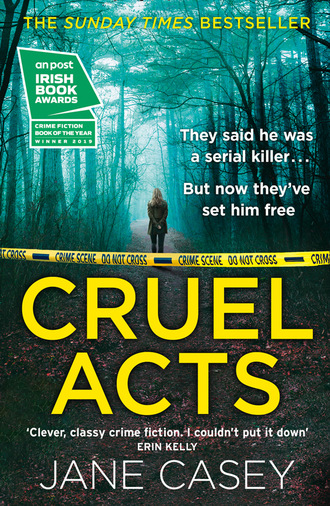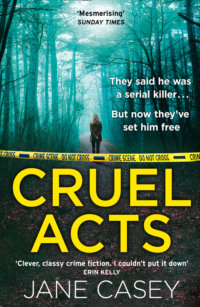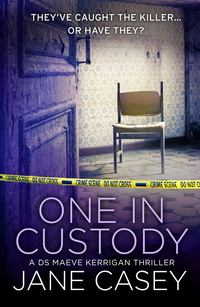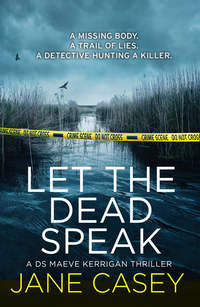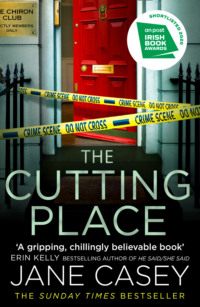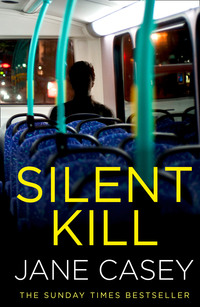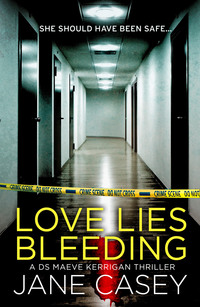‘If he’s stuck for cash he can always write the Leo Stone diet book,’ Derwent muttered, leaning over so his elbow pressed against my side painfully. ‘There isn’t a spare ounce on him.’
‘Not the time or the place,’ I hissed. ‘And give me some room.’
Derwent shrugged and folded his arms across his chest, making himself even broader. His knees moved an inch or two further apart, which I wouldn’t have thought possible. I shifted to my right, trying to put some space between his thigh and mine, and collided with my neighbour on the other side.
‘Sorry.’
Godley nodded, preoccupied. Unlike me, he was concentrating on the judge’s speech and sat statue-still. Beyond him sat DCI Paul Whitlock, who was in his late fifties. I’d met him before the hearing started, in the echoing, cathedral-like main hall of the Royal Courts of Justice. He had given me a quick, bruising handshake, without a smile. He had retired after Leo Stone’s conviction, before the crowning achievement of his career had turned into a messy disaster, and he lived on the Kent coast now. I assumed he spent most of his life out of doors because his skin was like old leather. Under his tan, he looked drawn and tired. What we were watching was the dismantling of a case he had built, painfully and in the full glare of public scrutiny. I could imagine how he was feeling.
The words fell from the bench like wood shavings, dry and dusty, delivered in a refined Anglo-Indian accent.
‘It is one of the abiding principles of the British legal system that a jury trial must be fair. A jury must be impartial. They must base their opinions on the words of counsel, on the evidence they hear and on the judge’s guidance. It is abundantly clear that in this case the jury did not do their duty. Rather, they chose to ignore all instructions and plunged into a world of speculation and ill-informed comment, aided by the media’s distorting lens. The duty of a jury is a sacred one. A defendant is entitled to expect that a jury will conduct themselves fairly. Otherwise justice cannot be done. And it has not been done in this case. The appeal is granted. I order that the prisoner, Leo Stone, be returned to prison and a further application be made to the Crown Court for bail pending a retrial.’
A murmur ran through the courtroom. In the dock, Leo Stone opened his eyes for the first time, staring about him as if he had just woken up. His eyes were dark, the pupils invisible. One of the officers with him took his arm, but gently.
‘Come on.’
Stone didn’t move. His eyes scanned the public gallery, row by row, until they stopped. For a moment I thought he was looking straight at me. Then the man in front of me raised a hand to shoulder height: a salute that received an answering nod from the prisoner. Only then did Stone turn, dropping his head and rounding his shoulders as he trudged down the steps to the cells below the courtrooms, where he would wait for a transfer to prison. Freedom was within his grasp but it wasn’t his quite yet.
The judges rose and filed out through a door behind them, and as the door closed the barristers abandoned their respectful demeanour instantly. The juniors gathered up their papers and legal reference books, moving with the speed born of long experience in the Crown Court, where the next case followed on the heels of the first. The opposing silks leaned towards one another as they tucked pens into pockets and settled their gowns on their shoulders more firmly, laughing as if they had been working together rather than competing for the judges’ favour. The journalists had slid out of the benches at the earliest opportunity, scattering down the long, tiled corridor to find a quiet nook where they could call their newsrooms.
On my right, Godley sighed. ‘Well. That’s that.’
‘Nothing else they could do.’ Whitlock stood up. ‘Frustrating, though. In some ways it feels worse than if we’d lost the first trial. I took a lot of satisfaction out of locking Stone up. It made me feel the world was a safer place for him being behind bars.’
‘We’ll put him back there for you. Fucking juries.’ Derwent eased his hips forward, slouching. It wasn’t actually possible to lounge on the high-backed wooden benches but he gave it his best shot.
Harry Hollingwood QC paused at the end of our bench. ‘Quick chat before I go back to chambers?’
‘Of course.’ Godley got up, energised. I made to follow him and Paul Whitlock, but hung back to let someone pass through the heavy doors before me. He hesitated for a beat, looking at me and I returned the scrutiny: dark hair, dark eyes, heavy eyebrows, a slight frame. The man who had been in front of me in the hearing, who had waved at Leo Stone.
‘Come on.’ The man behind him nudged him. He was a head taller and correspondingly broad, his shoulders straining against the fine fabric of his three-piece pinstripe suit. It was exquisitely fitted, I noted, just as I noted that he was strikingly handsome and roughly my age. He had a full beard, which ordinarily did nothing for me, but he made it look good. He stared at me briefly, assessing me in much the same way that I was eyeing him, but whether he was impressed or not I couldn’t tell.
The first man mumbled something and pushed the door open. I followed them out and stopped, watching them walk away down the corridor, one looking dazed and hurrying to keep up with the other’s long stride.
‘Not what you’d expect.’ Paul Whitlock nodded in their direction. ‘Considering.’
‘Who are they?’
‘Chap with dark hair is Kelly Lambert.’
I shook my head, not recognising the name.
‘Leo Stone’s son.’
‘His son?’
‘Long lost. Stone never married his mother – it was a casual relationship. They were both young when Kelly was born – early twenties, they would have been. Stone’s forty-eight now, though he looks older than me. Kelly’s mum died when he was young and he was taken into care. He had no contact with his dad for a long time, but Stone was in and out of prison so it was probably for the best. He wouldn’t have been a good influence, put it that way.’
‘How come they got back in touch?’
Whitlock shrugged. ‘Lambert found him when he was in prison in 2013. Started visiting him. When Stone came out, Lambert helped him get his life back on track. Lambert’s a carpenter. He got his dad some labouring work on building sites. Nothing skilled, but enough that he had a bit of cash. He wanted to keep him out of trouble, he said.’
‘That worked well.’
Whitlock gave a short laugh. ‘You said it.’
‘Did you look at him as a suspect?’ Derwent asked.
‘He had solid alibis for all the disappearances.’ Whitlock shook his head. ‘Kelly’s an argument for the care system. Whoever looked after him, they did a decent job. He seems to be the kind of chap who sees the good in everyone. Either that or he doesn’t want to believe that half his DNA is from a murdering shit. He’s been campaigning to get his dad released. Absolutely refuses to believe his dad could have done anything like that to those women, even though Stone had a history of violence towards his mum before they split up. Stone was a suspect in her death but they never made it stick.’
‘It’s a big jump from domestic abuse and burglary to murdering strangers,’ I said, as neutrally as I could. Whitlock bristled all the same.
‘It’s a good case. It’s solid. Stone got lucky on a technicality. There’ll be another trial and this time he’ll go away forever.’
And I’ll be proved right. He didn’t need to say it. I didn’t blame him for minding, in fact.
‘Who was the other guy with Kelly Lambert?’ Derwent asked, saving me the trouble.
‘That’s Stone’s solicitor, Seth Taylor.’ Whitlock grimaced. ‘Clever guy. Arrogant, though. He’s made his reputation off how he handled Stone’s case. They didn’t give us an inch, all the way through.’
‘I wouldn’t have thought he had much material to work with,’ Derwent said. ‘It was pretty cut and dried, as I understood it.’
‘It didn’t seem that way once the defence got to grips with the evidence.’ Whitlock shook his head. ‘Tell you what, if I ever get in trouble with the law, I’m calling Taylor. He’s all charm on the outside but if you challenge him, you’d better come prepared for a fight.’
‘DI Derwent is always prepared for a fight.’ I said it for the pleasure of making Derwent scowl.
‘I’m looking forward to seeing his face when Stone gets convicted again.’
I looked around, checking for eavesdroppers, and noticed a young woman in dark tights and a bulky coat. She was sitting in one of the alcoves outside the court, apparently concentrating on her phone.
‘We should take this somewhere else,’ I said quietly. Derwent, naturally, ignored me.
‘Jesus, I feel sorry for Lambert but he’s out of his tiny mind if he thinks his dad is innocent. I’ve never seen a more obvious psycho. He needs locking up again, as soon as we can possibly manage it. If we can get him put inside for anything at all, we should.’
‘We can’t harass him,’ I said.
‘I’m prepared to risk upsetting him if it means no one else dies,’ Derwent snapped.
‘Harry’s waiting,’ Godley said, with maximum disapproval, and on this occasion even Derwent took the hint.
10
The café in the Royal Courts of Justice was at the back of the ground floor, in an old courtroom that had been refitted with cheap tables and chairs. It was crowded with that peculiar mix of people that frequented the RCJ: the tax cases, the personal injury suits, the police officers and criminals and their families and the lawyers, all pretending to ignore one another. Hollingwood had found a table on the other side of the room. His junior, Kit Harries, waved at me energetically from the queue.
‘Coffee? Your usual?’ The barrister’s voice carried easily over the noise in the café. I gave him the thumbs up rather than trying to answer.
‘Do you know him?’ Derwent was beside me all of a sudden.
‘Kit? Yeah, he’s a nice guy. I’ve worked with him a few times.’
‘He looks better with his wig on.’
The barrister had a lot of very fine straw-coloured hair and a round face, and his wig had made him sweat so his hair was plastered to his head. As usual, Derwent wasn’t kind but he was right.
‘He’s a lovely person and he’s married, so be nice.’
‘I’m always nice.’
‘Not in a way that’s noticeable to the casual observer.’
Derwent moved away from me, grinning to himself. As if to prove me wrong, he went across to the queue to help Kit with the drinks. I followed Godley and Whitlock to the table, not without some misgivings. Derwent would take the opportunity to talk to Kit about me, unsupervised, and I liked Kit but he wasn’t the most discreet person I’d ever encountered. I couldn’t think of anything I needed to hide, specifically, but then again I couldn’t think of anything I’d like Derwent to find out about me. He knew too much already.
Without his wig and gown, Harry Hollingwood looked different too. His grey hair was swept back from a high square forehead and brushed against his collar at the back. He was compact, fit, fiftyish and he looked good-humoured, despite the loss in court. His small brown eyes were shrewd and full of life.
‘Sit down, sit down. I thought we should have a little post-mortem before we all went home.’
‘It was the result we expected,’ Whitlock said, which was his way of reassuring the lawyer that he didn’t blame him.
‘Couldn’t have gone any other way. The point is that we’ve got to prepare ourselves for a retrial.’
‘How soon can we expect the retrial?’
‘Soon,’ Hollingwood said. ‘He’ll be in the Crown Court tomorrow to be formally released from prison. How long do you want him out?’
‘Not long.’
‘Well, then. We’ll seek an early trial date. In the circumstances, we should get it. But that obviously means you have less time to conduct your reinvestigation. A month or two.’
‘We’ll manage,’ Godley said, with a confidence that I didn’t feel. ‘Have you met Maeve Kerrigan? She’s one of my best detectives.’
Hollingwood nodded to me. ‘Kit speaks very highly of you.’
‘I’ve always enjoyed working with him.’ I hoped I sounded like a tough and experienced detective sergeant, even if I was flustered to the point of blushing by what Godley had said.
‘I should say that the previous investigation was excellent.’ Hollingwood turned to Whitlock. ‘We were very happy with the evidence as it was gathered and presented to us. I am simply conscious of the fact that time has passed and the defence has had an opportunity to revisit the case they ran. We want to be prepared for them to take issue with anything that was awkward for them in the previous hearing. We’ll be disclosing anything new that you find out, of course, but with any luck it will be unanswerable.’
There was a brief hiatus while Derwent and Kit returned with the coffee. Kit had the expression of a man who had gone through a car wash in a convertible with the roof down. Derwent was at his most bland. He smiled at me as he sat down: never a good sign.
‘What was the defence?’ I asked quickly. ‘I read the files the other day and it seemed there wasn’t much room for doubt.’
‘There’s always room for doubt in a defence case,’ Hollingwood said. ‘They don’t have to prove he didn’t do it. They only need to confuse the jury. The idea is to reinterpret the evidence so the Crown’s account of what happened seems open to debate.’
‘He had a really good brief,’ Kit contributed. ‘One of those guys who does a closing argument that makes the jury fall in love with him a little bit. Make ’em laugh, make ’em cry.’
‘I don’t see where the doubt comes in,’ I said. ‘Stone was sitting in the house when they went there to ask him about the van. There was forensic evidence of Willa Howard having been in the room behind him.’
‘No,’ Kit said, grinning. ‘That was the mistake we’d made, according to his brief. There was forensic evidence in the cupboard in the room behind him. The defence alleged he’d found it dumped on a street corner and thought it would be useful. The defence said that someone else had used it to imprison Willa Howard before or after her death, and that Stone had unwittingly brought it into his home.’
‘And locked it in a room? And hid the key so we never found it?’
‘They said that Stone was worried about being burgled. He was obsessed with security.’
‘Yeah, funny how serial killers like their privacy.’ Derwent shook his head. ‘Surely there’s no way the jury would have fallen for it.’
‘You don’t need to convince all twelve of them. You can get a mistrial if you confuse three of them beyond the point where they know black from white.’ Hollingwood leaned back in his chair, amused rather than upset by it. ‘The prosecution has to play it dead straight – no showboating, no dramatics, just concentrate on the facts. The defence can do what they like.’
‘And as for being convincing, they won over more people than you’d think. Journalists, campaigners … and Sara Grey’s family.’ Whitlock’s voice dropped at the end of the sentence, and I realised with a mild sense of shock that he was angry. ‘I need to warn you about that. You’re going to have to handle them with care. They turned against the police during the initial investigation into Sara’s disappearance. My understanding is that the local CID didn’t impress them and stepped on a few toes. The fiancé was out of the country when it happened, but the detectives had their concerns about him. That bothered the family, who felt they were wasting time instead of locating her. Then they took offence at some of the questions that we had to ask. Sara’s body was well away from where we found Willa Howard. It was the cadaver dog that found her, not us. And there were differences in how the bodies were positioned. We didn’t want to assume they were both left there by the same killer. Dr Hanshaw was confident that both women had died in the same way, but by the time we found them, they had been left to nature for some time. The remains were skeletonised. He wasn’t able to specify a definite cause of death for either of them. Now, of course, the question is whether he missed something.’
Beside me, Godley was absolutely still. He wouldn’t give away how much he minded Glen Hanshaw’s reputation being questioned, but his very silence was loaded with emotion, I thought.
‘The Greys believe that we’ve never found Sara’s killer – that she wasn’t killed by the same person who killed Willa Howard, and that person was definitely not Leo Stone. They’ve bought into a conspiracy theory that we’re deliberately trying to mislead them. They don’t trust us, but they trust Stone and his son. Kelly Lambert made friends with them – can you believe that?’
‘Is that why they don’t want to believe Stone was Sara’s killer?’ I asked.
‘That and the lack of forensic evidence. They don’t think she would have stopped to talk to him that night. She was quiet – a bit shy. Timid. She wouldn’t have argued with a guy like Stone. She’d have crossed the street to avoid him.’
‘If he let her do that.’
‘Then there’s the fact that there was no trace of her in Stone’s house or his van.’ Whitlock sighed. ‘I wish we’d connected the two cases earlier, but we didn’t. I wish I’d been able to investigate Sara Grey’s disappearance. It bothered me that they hadn’t taken it seriously enough. They could have put more resources into it. Then again, we knew Willa Howard was missing almost as soon as she disappeared – within twelve hours. It was a densely populated area with a lot of footfall, even at that time of night. Halloween jogged people’s memories too.’
‘You did a remarkable job to track down the van.’ Godley leaned forward, holding Whitlock’s gaze with that intensity that made you feel you could walk through fire for him, that you wouldn’t mind dying for him … ‘Without the van, we would probably never have made a connection between the missing women and Stone, even if we’d found the bodies. The van broke the case.’
Whitlock ducked his head. ‘We did all right. I had a good team. I may be wrong but I don’t think there’s much new ground to explore when it comes to Willa Howard’s death.’
Except how she died, and where, and when. I thought of Dr Early revisiting the files, the photographs. ‘How do the Howards feel about this?’
‘They think Stone is guilty. It’s easier for them than the Greys, I think, because they didn’t believe a word of the story about him finding the cupboard in the street. There’s the van in the right area and the blood – that’s enough for them. They fell out quite badly with the Greys over it, which was a shame. Nice people.’
‘Are they the kind of nice people who would mind if we apply to exhume their daughter’s body?’ Derwent, blunt as ever.
Whitlock winced. ‘Depends on how you approach it.’
‘With great sensitivity,’ Godley said, and I wondered if he’d forgotten how Derwent preferred to work. I had a question to ask myself.
‘Tell me about Rachel Healy.’
‘A dead end.’ Whitlock’s face had hardened, stubbornness making it into a thing of angles. There was something in Whitlock’s voice that sounded final, as if the subject was irrelevant and therefore the discussion was at an end.
‘She went missing not long before Willa Howard.’
‘We concluded the disappearance was too close to Willa for it to be connected. He took one in July and one in October, not two. That’s the sort of thing a killer does when they’re losing control – when they’re running out of time. Stone had no idea we were going to knock on his door, and he didn’t take a fourth woman after Willa Howard, though we didn’t catch up with him for a few weeks.’
‘Maybe something went wrong,’ I said. ‘Maybe it wasn’t a satisfying murder as far as he was concerned.’
‘We did look for her. We never found the body. The conclusion we reached was that she was never in Stone’s house or his van. The blood from under the floorboards wasn’t conclusive. It sent us on a wild goose chase. We were under pressure to clear up as many disappearances and murders as possible and Rachel Healy got lumped in with the other two.’
‘There was a reason the CPS didn’t charge him with her kidnap and murder,’ Hollingwood said. He was watching me, his face open and friendly. I knew when I was being placated and it prickled along my nerves. ‘I didn’t want Rachel Healy on the indictment. The evidence that he was involved in her disappearance was circumstantial at best. The forensics were the weakest part of our case. I was of the opinion that including her and introducing the idea that a third woman had died in that room – whether it was Rachel Healy or not – could only damage us. It would have provided an opportunity to the defence to muddy the waters. We had no body. We were asking the jury to take too many leaps of faith – that she was dead, that Stone had been involved, that her body had been left somewhere other than the area where the other two women were found, for a reason we didn’t know. Too many questions there, don’t you think?’
‘Questions that deserve an answer,’ I said.
‘We did our best.’ Whitlock, bristling.
Derwent got there before I could. ‘No one’s saying you didn’t. There’s a reason she’s on this case.’
She being me. I opened my mouth to change the subject before he said anything else, but he steamed on.
‘Kerrigan can charm the birds from the trees and find things you never knew were missing. If there’s a way to trace Rachel Healy and tie her murder into this case, Kerrigan will find it. Once she’s decided she’s going to do something, she doesn’t give up.’ Derwent paused for a beat. ‘It makes her bloody irritating to work with, obviously, but she’s right about this one.’
‘Thanks,’ I said, and he grinned at me. A ripple of amusement ran around the table, a welcome break in the tension. I waited until they’d stopped laughing.
‘Anything on Rachel Healy will be new to the defence. If Stone killed her, he thinks he got away with it. At the moment we don’t even know where she was before she disappeared. It’s not going to be easy to make enquiries after so many years, but it’s surprising what people can remember when you ask.’
‘All this time and not a sign of her body. I really wanted to find her.’ Whitlock grimaced. ‘I dream about her sometimes. Gets under your skin, you know.’
I did know, all too well.
‘We’ll look after her,’ Derwent said to Whitlock. ‘We won’t let you down.’
The retired policeman nodded and attempted to smile. It flickered across his face uncertainly, like a lightbulb about to blow.
11
‘The rural dream. You can keep it,’ Derwent said. ‘Why would anyone want to live here?’
‘Grammar schools. Commutable distance from London. Local amenities. Decent lifestyle.’
‘Yeah, but apart from that.’
‘I don’t think we’re seeing it at its best.’
We were driving out of London towards Aylesbury, a medium-sized market town where Sara Grey had grown up. Her parents still lived there, outside the town. It was a cold day, the sky the colour of steel, and the fields were boggy from heavy rain the night before. Crows hunched in the branches of trees and along fences like witches’ familiars, their rasping call echoing across the countryside.
I went back to the opinion column I was reading out from my phone.
‘“In the era of social media, when everyone has access to the internet all the time, is it even possible to have a fair trial by jury? A case such as that of Leo Stone is the ideal test: a horrific series of headline-grabbing crimes, a suspect who seems to fit the image of a ruthless killer, grieving families and photogenic victims, and an unregulated internet full of rumours. If it’s a crime to be unattractive, then the prisons should be overflowing. Leo Stone was on trial for murder but he was judged on his past and his appearance. That’s not justice – it’s prejudice.”’
I paused expectantly, and was not disappointed.


